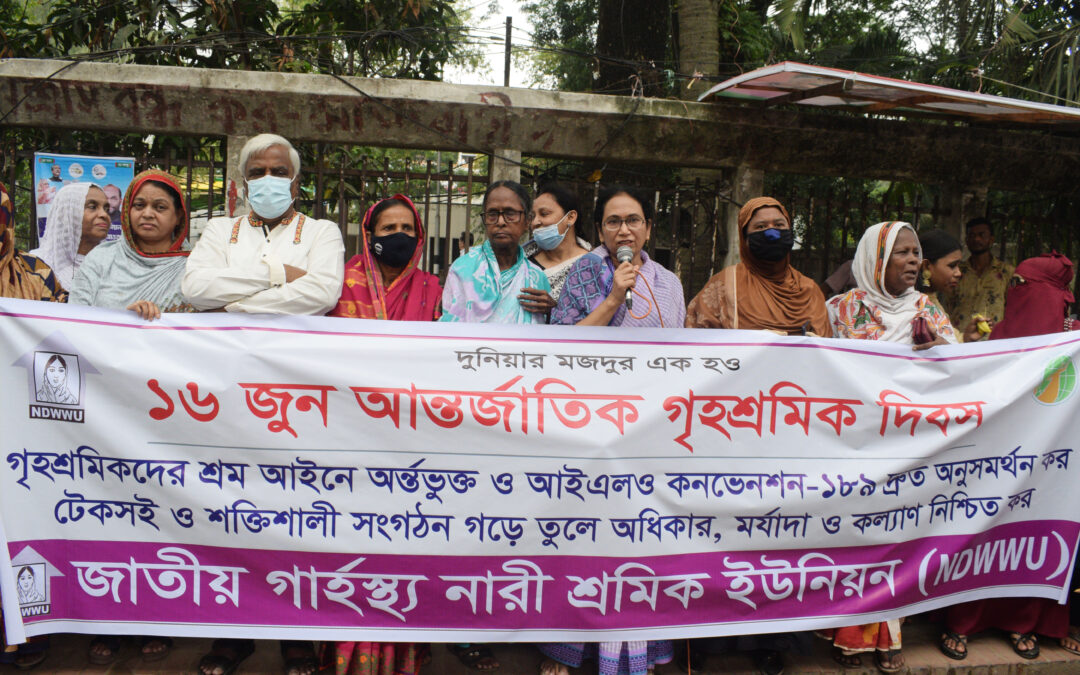
Jun 22, 2022
Demanding the ratification of International Labor Organization (ILO) Convention 189, Decent Work for Domestic Workers, leaders and members of the National Domestic Women Workers Union (NDWWU) on June 16, 2022, rallied in front of the National Press Club in Bangladesh to mark International Domestic Workers Day.
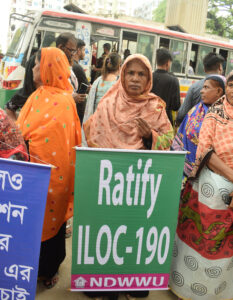
They also demanded the ratification of International Labor Organization (ILO) Convention on violence and harassment in the world of work (ILO C190). A Bangladesh Institute of Labor Studies (BILS) report says 12 domestic workers were raped in 2020.
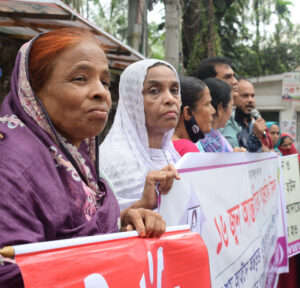
Although Bangladesh presided over the 100th session of the International Labor Conference and voted for ILO C189, the country’s domestic workers still are not protected by the global treaty because the government has yet to ratify it.
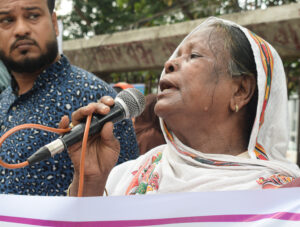
When Sitara Begum, 60, approached law enforcement after being harassed at her job as a domestic worker they did not assist her, and she was forced to flee from her employer. “In 22 years of working as a house help, I had to endure many such incidents. When does our agony stop?” she asks.
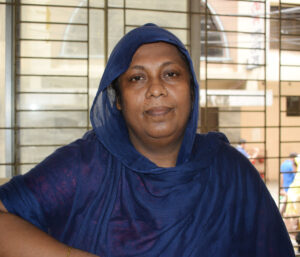
Domestic worker Rehana Akter Mita, 37, her family’s only breadwinner, earns $96.59 per month, which does not cover living expenses. Mita often takes loans from relatives to support her son’s education and husband’s medical costs.
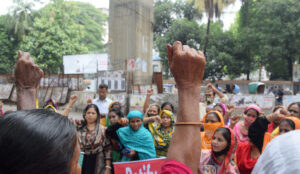
The 2006 Bangladesh Labor Act does not recognize domestic worker rights. Domestic workers and their unions are urging the government to ratify ILO C189, a global treaty ensuring domestic workers their rights on the job.
Photos: Solidarity Center/Amir Hasan Shahriar
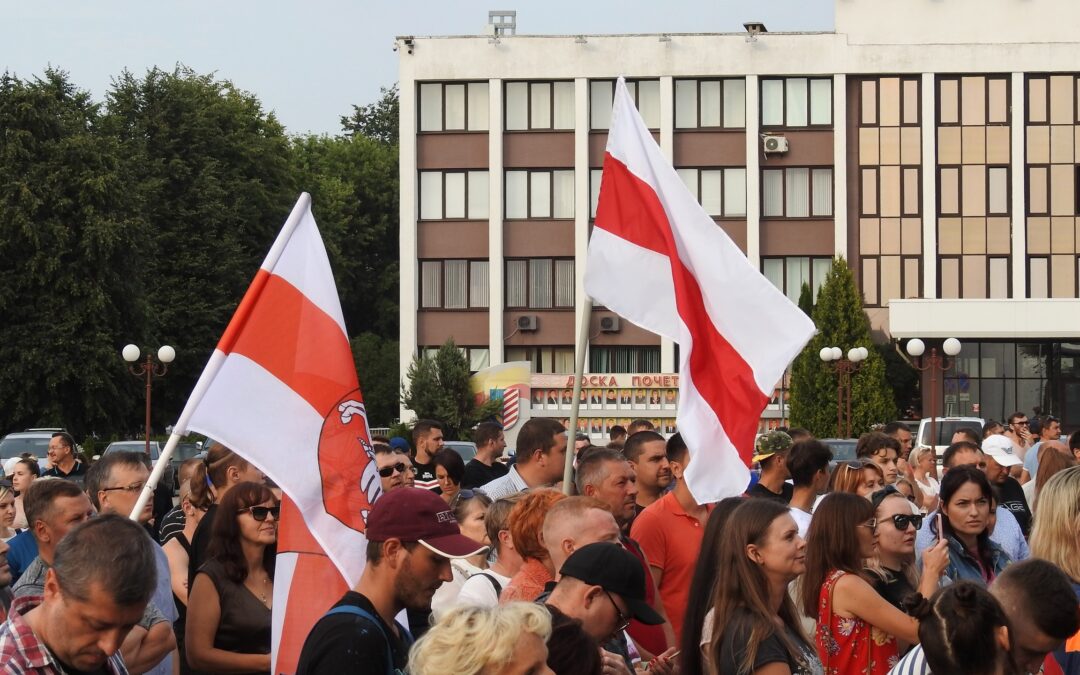
Apr 26, 2022
In a letter to Belarus Prime Minister Roman Golovchenko and Head of the Administration of the President Igor Sergeyenko, the AFL-CIO condemned the recent detention of 17 trade union leaders who represent their country’s independent labor movement and the shuttering of union offices there.
Calling for an immediate release of all those detained and resumption of the activities of the Belarusian Congress of Democratic Trade Unions (BKDP) and its affiliate unions, the AFL-CIO letter cites “a troubling increase in anti-union harassment” in the country and points to an international labor movement protest against anti-union repression in Belarus.
Those arrested and detained include BKDP President Aleksandr Yarashuk and Vice-President Sergei Antusevich, as well as other activists, independent journalists and legal experts. The offices of the BKDP have been closed, as have the offices of its four affiliated unions.
The government of Belarus has been repeatedly called out by the International Labor Organization (ILO) for its systematic violations of freedom of association and core labor standards.
Read the full letter.
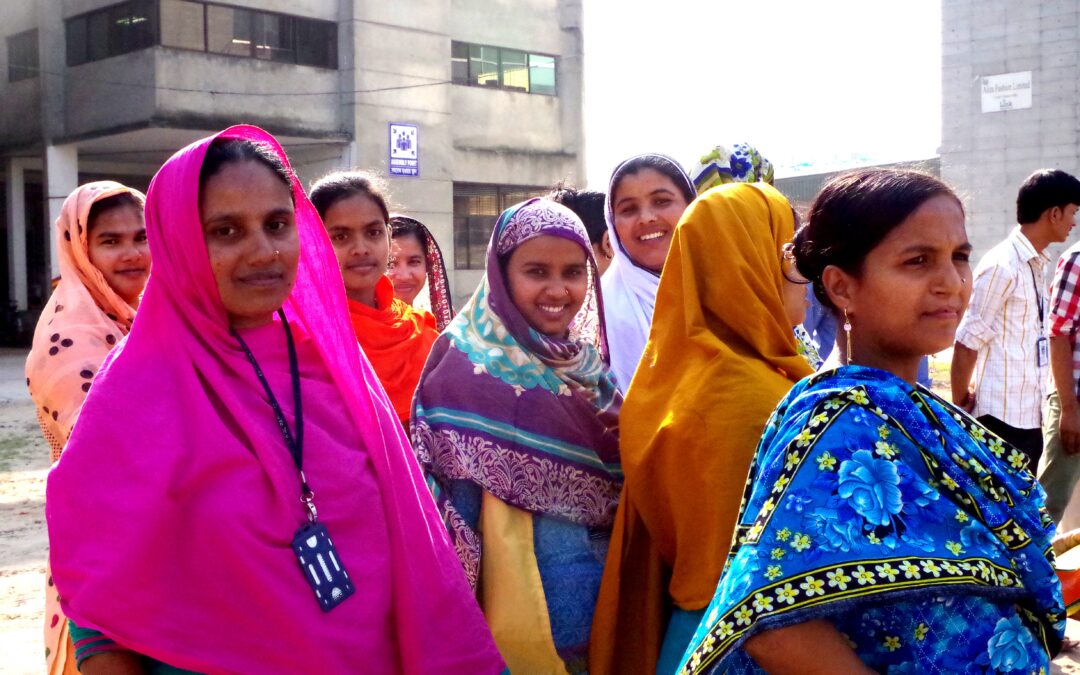
Apr 20, 2022
A new internal Solidarity Center survey finds that, although Bangladesh claims the global lead in eco-friendly ready-made garment (RMG) manufacturing, government officials, factory owners and global fashion brands are not adequately addressing unhealthy working conditions, dangerous pollutants in the factory-adjacent communities in which garment workers are trapped by poverty wages, long working hours, or the negative effects of garment manufacturing on the environment.
Even in so-called green factories, “different stages of garments production may have serious impact on the physical and mental health and safety of the workers—emanating from yarn dust, excessive heat, use of chemicals, accidents, communicable diseases, lack of basic amenities and excessive workload,” says report author University of Dhaka International Relations Professor Dr. Syeda Rozana Rashid Rashid.
Bangladesh is the world’s top global sourcing location for international fashion brands. Of the country’s estimated 5,000 garment factories, in 2022 only 155 were certified as Leadership in Energy and Environmental Design (LEED) green factories.
A comprehensive green solution, finds the report, requires engagement with workers and their unions as social partners in the design and implementation of environmental practices that also improve conditions for workers through collective bargaining and policy development. Partnership with workers and their unions will promote properly implemented climate-protection laws, policies and processes that better protect RMG workers from unhealthy and unsafe workplaces, factory-adjacent community members from garment production pollutants, and all citizens from climate change impacts, such as flooding and drought.
Also, to protect their health and well-being, garment workers must earn wages sufficient to pay for housing located away from their jobs, and work hours that make transportation from greater distance possible. More than 4 million people work in the RMG sector, most of whom are young women living near the factory where they work.
“The area is full of odorous waste and chemicals,” says a union leader about workers’ living conditions in her community.
“Even local drinking water takes different colors due to the nature of different chemicals disposed of in the river. Situations become intolerable during the rainy season when roads are overflown by the toxic water under heavy rain. Workers get infected by skin diseases.”
The Bangladesh government has declared three Dhaka rivers biologically “dead” due to the untreated effluent flowing into them.
Interviews with 20 union members and leaders, and other experts from Dhaka and Gazipur, Savar and Chattogram regions also found that:
- Not all green factories are labor rights compliant.
- Garment workers’ vulnerability to environmental degradation and climate change will increase until their basic rights and needs are addressed by government and employers.
- The communities surrounding RMG facilities are significantly impacted in terms of health, quality of life and, in many cases, by associated impacts on their livelihoods from farming and fishing.
- Suffering due to excessive heat has become pervasive in RMG factories due to climate change, especially in the hot summer season, where lack of ventilation increases workers’ risk of being infected with communicable diseases, including COVID-19.
- Many factories will not allow workers to organize, impeding their education on how production, climate change impacts and environmental degradation are linked to their health and well-being.
- Global fashion brands largely do not take responsibility or accountability for environmental degradation, instead putting the responsibility on suppliers.
- Although global fashion brands use their code of conduct as a voluntary policy tool to focus on international standards, they mostly ignore climate issues and their impact on workers and their communities.
- The impact of climate change on factory workers is overlooked by formal inspection and monitoring mechanisms.
- Union respondents cannot engage global buyers in pressuring local producers to implement measures to improve workers’ living conditions.
- Without implementation demands and effective implementation processes, global brands’ prescribed eco-friendly standards appear to exist for appearances only in a process known as “greenwashing.”
“The factory is not green for the workers. We see a rosy picture; we hear nice stories. In reality, you would hardly hear workers’ voices in a green factory,” reports a union leader.
Bangladesh’s RMG sector accounts for 84 percent of the country’s exports. RMG exports more than doubled from 2011 through 2019—from $14.6 billion to $33.1 billion.
With long-term experience in people-centered policy and legislative rights-based advocacy, workers and their unions in Bangladesh are uniquely positioned to push forward a rights-based climate agenda as well as participate in a global climate justice movement.
“Without a union to safeguard workers’ interests and freedom of expression, no factory can properly be considered green,” says Sonia Mistry, Solidarity Center climate change and just transition global lead.

Apr 1, 2022
Two union leaders were killed on Monday during a violent attack on a train headed to north-central Kaduna from Nigeria’s capital, Abuja. Musa-Lawal Ozigi, secretary-general of the Nigeria Trade Union Congress (TUC), and Akin Akinsola, chairman of TUC-Kwara State, are two of at least eight people left dead. Dozens were wounded while an unknown number of those who were abducted remain missing.
“Nowhere is safe now—we cannot travel by air; the road is not safe and neither is the rail. Is Nigeria a failed state?” said TUC President Quadri Olaleye.
The TUC–one of two major labor federations in the country—together with other labor groups and pro-poor and pro-democracy organizations are engaged in a transformative governance campaign to better protect citizens’ security and access to adequate public services and civil and labor rights. In Nigeria, 93 percent of working people toil in the informal economy for low wages, unprotected by labor law and without social services such as pensions and healthcare.
Together with other labor groups, the TUC and its affiliates are engaged in Solidarity Center-supported campaigns for legal recognition of app-based workers to improve their wages, working conditions and safety, and ratification of ILO Convention 190 to prevent and address violence and harassment in the world of work (GBVH).
Nigeria’s unions are familiar with challenges posed by violence in the country. In northern Borno state—where an uneasy but relative peace following more than a decade of violence has left over 7.5 million people still in need of humanitarian assistance—unions have played a key role in supporting their members, including returning teachers, healthcare workers and civil servants.
“The loss of Secretary General Musa-Lawal Ozigi and TUC-Kwara State Chairman Akin Akinsola is a severe blow to unions’ efforts to protect the interests and welfare of Nigeria’s working people,” said Solidarity Center Africa Regional Program Director Christopher Johnson.
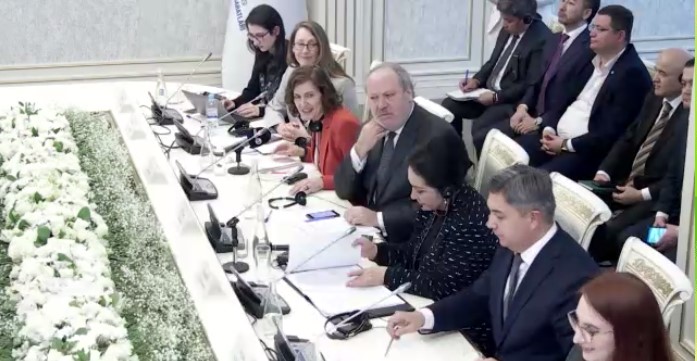
Mar 11, 2022
The Cotton Campaign—a global coalition of human rights, labor, responsible investor and business organizations—yesterday ended its call for a global boycott of Uzbek cotton at an event hosted by the country’s Ministry of Labor for media, activists and government officials in Tashkent, Uzbekistan. The announcement came as the Uzbek Forum for Human Rights released a report finding no central-government–imposed forced labor in the 2021 harvest, a success which the Campaign is proposing as a template for removing forced labor from the world’s supply chains. An estimated 2 million children have been removed from child labor and half a million adults from forced labor in Uzbekistan’s cotton sector since the multi-sectoral campaign formed.
“[We] have been looking forward to this day for over 14 years,” said Cotton Campaign co-founder and former U.S. Deputy Assistant Secretary of State for Democracy, Human Rights and Labor Bennett Freeman, who saluted the determination and courage of Uzbek-based activists and cotton-field monitors.
The historic achievement came after persistent engagement by Uzbek activists, who took on extraordinary personal risk to uncover and document forced labor, joined by multinational brands, international advocates and worker rights groups like the Solidarity Center, and a commitment by the government of Uzbekistan to end its use of forced labor. The boycott began in response to a 2009 petition by Uzbek civil-society activists that launched the Cotton Campaign’s Uzbek Cotton Pledge Against Forced Labor. Since then, 331 brands and retailers signed the pledge, including many of the world’s largest brands, among them C&A, Gap Inc. and Tesco.
“As a journalist and citizen of this country, I am proud to participate,” said Uzbek Forum for Human Rights cotton field monitor Muazzam Ibragimova, who added that her own children were likely headed to the cotton fields as recently as a decade ago.
Although Uzbek Forum’s report found that cotton was harvested without systematic state-imposed forced labor, monitors found cases of coercion and interference by local authorities, as well as individual cases of forced labor. Because independent groups that conduct field level monitoring and capacity building are unable to register and operate freely, progress is “at risk” says the Cotton Campaign in its press release. Given repressive policies that limit freedom of association in Uzbekistan and supply chain practices that have contributed to eroding labor standards in garment producing countries around the world, the Cotton Campaign is calling on the Uzbek government and brands to support worker rights as the industry is poised to grow, and for the government to open the country’s civil society to create the enabling environment necessary for responsible sourcing.
“We need a voice from the ground,” said the Solidarity Center Senior Program Officer for Europe and Central Asia Abby McGill, who added that workers must lead the charge if there is to be permanent success and continued progress in Uzbekistan’s fight against forced labor.
Cotton Campaign Steering Committee member, GLI-ILRF Forced Labor Program Director and human rights lawyer Allison Gill recognized the efforts and courage of Uzbek Forum monitors and pointed to the coalition’s success in Uzbekistan as a template for combating the use of forced labor in cotton sourced from other countries. More than one fifth of the world’s cotton is produced in China’s Xinjiang region where significant evidence of human rights abuses, including suspected forced labor, has been reported.
The Cotton Campaign, of which the Solidarity Center is a long-time member, is a global coalition of international human and labor rights NGOs, independent trade unions, brand and retail associations, responsible investor organizations, supply chain transparency groups, and academic partners. The campaign encourages responsible sourcing to ensure that reforms continue to benefit workers, farmers, and civil society.
GLJ–ILRF is a newly merged organization that brings strategic capacity to cross-sectoral work on global value chains and labor migration corridors.
Uzbek Forum for Human Rights is a Berlin-based NGO dedicated to protecting and promoting human rights and strengthening civil society in Uzbekistan.










